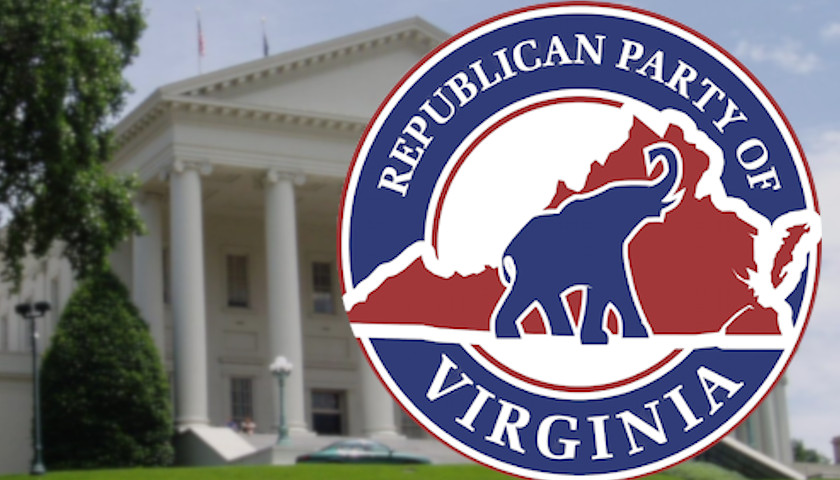The Republican Party of Virginia (RPV) State Central Committee (SCC) will hold a virtual meeting on Saturday to determine whether a convention or a primary will be used to nominate their statewide candidates for 2021. The decision is strategically important for candidates and power brokers, so rumors of intrigue surround preparations for the meeting.
Virginia political insiders alleged to The Virginia Star that potential GOP gubernatorial candidate Glenn Youngkin, the recently retired CEO of international consulting firm Carlyle Group, offered the RPV hundreds of thousands of dollars in donations in exchange for backing a primary over a nominating convention.
However, RPV chair Richard Anderson denied the rumors.
“No, that is not true. I got a phone call this morning from one of the members of the SCC that said to me they had heard that rumor,” Anderson said. “And the specific response I gave to them is that it’s absolutely, undeniably false.”
Anderson said, “As the state chairman, I’m the only one who is having these sorts of conversations with any potential donors, with any candidates whatsoever–and if someone who is a candidate for office, or speaking in support of a candidate for office, were to say to me that they would offer a quid-pro-quo of a financial donation in exchange for the selection of a specific nomination method, I would consider that to be a flat-out bribe that I would reject it.”
He said, “And additionally, I don’t think the [SCC], if that were to occur, would ever agree to that.”
Anderson added, “Mr. Youngkin has not made an offer like that.”
The newly elected chairman, in his first year, said that traditionally, the RPV would hold its annual meeting at a resort. “I don’t know this for a fact, but I suspect [Youngkin] would have done the same thing that any other statewide candidate would have done, he probably would have purchased a sponsorship of the event at some level, but that never actually happened.”
Youngkin has allegedly simultaneously lobbied SCC members in the party for a primary to be selected.
Virginia political operatives who contacted The Virginia Star say the former international business leader, who has pledged to spend upwards of $40 million of his own money in his bid for governor, would benefit from a primary in lieu of a convention.
Lawyer and candidate for Virginia’s 83rd House of Delegates seat Tim Anderson told The Virginia Star that primaries favor candidates with good name recognition and broad support across the state while conventions are an opportunity for more hard-line sects within the party to nominate a more hard-core conservative candidate.
Tim Anderson cited the 2020 Republican convention battle between U.S. Congressman Denver Riggleman (R-VA-05) and challenger Bob Good.
“[Riggleman] officiates a gay wedding and it infuriates his base,” Tim Anderson said. “So the Republican unit leaders out there, very angry at Riggleman, [choose] a convention and they move it to Lynchburg where Bob Good is from, and they hold it at Bob Good’s church.”
Tim Anderson said Virginia’s fifth district is the size of New Jersey. “They home cook him, they put it out there in the western part of the state. And so Bob Good won the convention, and you know that’s what they wanted.”
Conventions favor more hard-line candidates because the process itself takes more time and requires delegates to be present at an event in person, while a primary is a lower investment of effort for the average voter, Tim Anderson said. “The Tea Party comes to a convention and they bring 50 delegates, and they’re like, “We’re gonna pledge our delegates to the person who says that balancing the budget is their number one priority,”” Anderson said.
“If there’s five guys running in a convention, the candidate that is spit out of the convention is probably the one that is the most conservative, the closest to the core hard values of the Republican Party, what I like to call a true believer.” Tim Anderson said, “That candidate is not a generally appetizing candidate to the general election, to the voters of Virginia because they’re too far to the right.
Tim Anderson said he doesn’t expect the party to choose a convention this year because the logistics of doing it safely during COVID-19 were so difficult last year.
In a video posted on Facebook Monday, Senator Amanda Chase (R-Chesterfield) said, “I believe that conventions have historically disenfranchised candidates and voters. Unfortunately, the hard cold facts are this: That we have had numerous conservatives that basically had shenanigans within the pay-to-pay Republican establishment.”
Chase said as a result, “I will only seek the Republican nomination in a primary.”
A primary likely favors Chase, since with multiple other candidates splitting the vote, Chase’s strong pro-no compromise, pro-gun base can power her to the nomination with under 30 percent of the vote.
“She will do well with either primary or convention,” Chase spokesman Philip Search said on Friday. “She is known as the grassroots queen of Virginia, she has worked with dozens of campaigns throughout her career. She just wants to be up front and honest with everybody that a primary is the way to go.”
Gubernatorial candidate Kirk Cox said in a statement, “As a declared candidate, I don’t think I should be putting my thumb on the scale. I will pursue the Republican nomination whether the SCC selects a primary or a convention. I trust they will make the right decision in the best interest of the party.”
A convention might favor potential gubernatorial candidate Pete Snyder, who already has name recognition in the RPV. Snyder ran for lieutenant governor in the 2013 RPV convention, giving him familiarity with the system. Additionally, Snyder’s COVID-19-era small business relief program the VA 30 Day Fund has given Snyder positive 2020 headlines. Snyder is well respected as a powerful one on one campaigner, the key to winning conventions.
Youngkin also launched a non-profit in 2020, the Virginia Ready Initiative, but does not have as much long-term experience or name recognition within the RPV.
Whatever the SCC decides tomorrow, Chairman Rich Anderson thinks it will be close.
“I have not surveyed members of the SCC individually,” he said. “[My guess] is that the [SCC] is fairly evenly divided on the question and so the final outcome will probably only be a bare majority.”
– – –
Eric Burk is a reporter at The Virginia Star and the Star News Digital Network. Email tips to [email protected].
Background Photo “Virginia Capitol” by Anderskev. CC BY 3.0.





